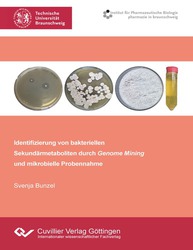| Departments | |
|---|---|
| Book Series (97) |
1381
|
| Nachhaltigkeit |
3
|
| Gesundheitswesen |
1
|
| Humanities |
2369
|
| Natural Sciences |
5408
|
| Mathematics | 229 |
| Informatics | 319 |
| Physics | 980 |
| Chemistry | 1364 |
| Geosciences | 131 |
| Human medicine | 243 |
| Stomatology | 10 |
| Veterinary medicine | 108 |
| Pharmacy | 147 |
| Biology | 835 |
| Biochemistry, molecular biology, gene technology | 121 |
| Biophysics | 25 |
| Domestic and nutritional science | 45 |
| Agricultural science | 1005 |
| Forest science | 201 |
| Horticultural science | 20 |
| Environmental research, ecology and landscape conservation | 148 |
| Engineering |
1795
|
| Common |
98
|
|
Leitlinien Unfallchirurgie
5. Auflage bestellen |
|
Advanced Search
Identifizierung von bakteriellen Sekundärmetaboliten durch Genome Mining und mikrobielle Probennahme (English shop)
Svenja Bunzel (Author)Preview
Extract, PDF (600 KB)
Table of Contents, PDF (120 KB)
Aufgrund der steigenden Vorkommen resistenter bzw. multiresistenter Pathogene ist es notwendig neue Therapeutika mit antibiotischer Aktivität zu entdecken. Ein großes Potential besitzen die Bodenbakterien als Bildner neuer Antibiotika, allen voran die Gram-positiven Streptomyceten. Sie bilden u.a. Nicht-ribosomale Peptide (NRP). Um neuartige NRP zu entdecken, kann ein Genome Mining Ansatz verfolgt werden.
In dieser Arbeit wurde ein neuartiges biosynthetisches Gencluster, welches für 2 Nicht-ribosomale Peptidsynthetasen codiert, identifiziert. Da in dem Cluster mehrere clusterspezifische Regulatoren und Gene für Selbstresistenzen enthalten sind, wurde angenommen, dass das NRP eine antibiotische Wirksamkeit besitzt. Ziel der Arbeit ist es das gebildete NRP zu identifizieren und isolieren.
| ISBN-13 (Hard Copy) | 9783736977105 |
| ISBN-13 (eBook) | 9783736967106 |
| Final Book Format | A5 |
| Language | German |
| Page Number | 186 |
| Lamination of Cover | glossy |
| Edition | 1. |
| Publication Place | Göttingen |
| Place of Dissertation | Braunschweig |
| Publication Date | 2022-12-07 |
| General Categorization | Dissertation |
| Departments |
Pharmacy
Pharmaceutical biology / Pharmacognosy |
| Keywords | ¹⁴C-Valin, A-Domänen, Aneurinibacillus migulanus, Antibiotika, antimykotisch, antiSMASH, Arzneipflanzen, Bakterien, Bioinformatik, Bodenproben, Candida albicans, Clusterregulation, CRISPR/Cas9, E. coli, Gencluster, Genomanalyse, Genome Mining, Gibson Assembly, Golden Gate, Homologe Rekombination, HPLC, Kirby-Bauer Test, Klassifizierung von Bakterien, Massenspektrometrie, Naturstoffe, Nicht-ribosomale Peptide, Nicht-ribosomale Peptidsynthetasen, PCR, radioaktive Dünnschichtchromatographie, Replica Plating, Resistenzen, Rhizosphäre, Sekundärmetabolite, Stachelhaus Code, Staphylococcus carnosus, Streptomyces fragilis Streptomyces leeuwenhoekii, Streptomyceten, zytotoxisch, γ-¹⁸O₄-ATP-PPᵢ-Austausch-Assay, ¹⁴C-valine, A-domains, Aneurinibacillus migulanus, antibiotics, antifungal, antiSMASH, medicinal plants, bacteria, bioinformatics, soil samples, Candida albicans, cluster regulation, CRISPR/Cas9, E. coli, gene cluster, genome analysis, genome mining, Gibson assembly, Golden gate, homologous recombination, HPLC, Kirby-Bauer test, classification of bacteria, mass spectrometry, natural products, non-ribosomal peptides, non-ribosomal peptide, synthetase, PCR, radioactive thin layer chromatography, replica plating, resistance, rhizosphere, secondary metabolites, Stachelhaus code, Staphylococcus carnosus, Streptomyces fragilis, Streptomyces leeuwenhoekii, streptomyces, cytotoxic, γ-¹⁸O₄-ATP-PPᵢ exchange assay, Dünnschichtchromatographie, Bidestlliertes Wasser, Kondensationsdomäne, Diodenarray-Detektor, Dulbecco`s Modified Eagle`s Medium, Hochleistungsflüssigkeitschromatographie, Large ATP-binding regulators of the LuxR family, Massenspektrometrie-Kopplung, Polyketidsynthase |
| URL to External Homepage | https://www.tu-braunschweig.de/pharmbiol |








